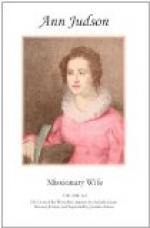In another letter of a later date, she describes herself as sitting at her table in a back porch, from which she can see her “dear husband,” in a room before her, teaching nine little heathen boys; while in one of the long verandahs on each side of the house, the native Christians are holding a prayer-meeting in their own language, and in the other, a Chinese convert is urging three or four of his deluded countrymen to turn from their stupid superstitions to the service of Jehovah.
She mentions also the baptism of a Karen, (the name of a tribe in Burmah,) “a poor man, who had been converted while in the service of Mr. Judson;” little knowing the importance of the fact thus recorded. This “poor man,” in fact formerly a slave, and whom the writer of an article in a former number of the Quarterly Review would have sneered at as he did at the “fisherman,” the wonderful trophy of divine grace, mentioned in Mrs. Judson’s history of the mission, was the famous Ko-thay-byu, whose life has been written by Mr. Mason, and who, by his zeal and success in missionary labor, obtained the name of “the Karen Apostle.” He was the first to introduce to the notice of the missionaries, the tribe to which he belonged, a people so remarkable, that we are unwilling, even in our brief sketch, to pass them over without notice.
The Karens, according to a writer in the North American Review, are a savage and ignorant race of men, (their name in the Burman language signifying wild men,) scattered in vast numbers over the wilds of Farther India, and inhabiting almost inaccessible tracts, among the mountains and forests. Their peculiar physiognomy, strange traditions, and some of their customs have led to the opinion that they were of Hebrew origin, though some think they are of the Caucasian variety of the human species. They differ much from the Burmans, by whom they are heavily taxed and grievously oppressed, and in every way treated as inferiors.[9] “Their traditions have been preserved, like the poems of Ossian, by fond memories delighting to revive the recollections of former glory and prosperity; repeated by grandsires at even-tide to their listening descendants, and sung by mourners over the graves of their elders.
“They believe in a God who is denominated Yu-wah,” a name certainly similar to the Hebrew Jehovah. Some of their traditional songs are curious and interesting. For instance,
“God created us in ancient
time,
And has a perfect knowledge
of all things;
When men call his name, he
hears!”
And again
“The sons of heaven
are holy,
They sit by the seat of God,
The sons of heaven are righteous,
They dwell together with God;
They lean against his silver
seat.”
The following stanza, says the writer above referred to, might be mistaken for the production of David or Isaiah.




